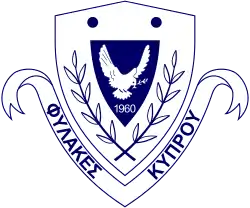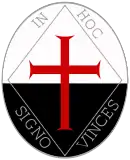| Coat of arms of Cyprus | |
|---|---|
.svg.png.webp) | |
| Armiger | Republic of Cyprus |
| Adopted | 1960 |
| Blazon | Copper, a dove volant facing to the sinister Argent in its beak an olive branch; in base, the numbers '1960' Argent[1] |
| Supporters | A Wreath of olive branches Vert |
The coat of arms of Cyprus may refer to the national symbol used in the Republic of Cyprus.
Republic of Cyprus
The coat of arms of the Republic of Cyprus depicts a dove carrying an olive branch, symbolizing peace, over "1960", the year of Cypriot independence from British rule. The background is a copper-yellow colour; this symbolises the large deposits of copper ore on Cyprus (chiefly in the form of chalcopyrite, which is yellow in colour). The two-part wreath represents the two ethnic groups of Cyprus, Greeks and Turks.[2]
The Cypriot coat of arms was selected as the main motif of a high value collectors' coin in 2008, the Cyprus introduction to the Eurozone commemorative coin, minted in 2008. The obverse depicts the coat of arms of Cyprus while the reverse depicts Cyprus connected with a ring to Europe, on a transfigured map.
.svg.png.webp) Coat of arms of the Republic of Cyprus (1960–2006)
Coat of arms of the Republic of Cyprus (1960–2006) Coat of arms of the Cyprus Prisons Department
Coat of arms of the Cyprus Prisons Department
Northern Cyprus
| Coat of arms of Northern Cyprus | |
|---|---|
 | |
| Armiger | Turkish Republic of Northern Cyprus |
| Adopted | 15 November 1983 |
| Crest | Star and crescent Argent, inscription "1983" Vert |
| Blazon | Or, a dove Argent carrying an olive branch Vert |
| Supporters | Olive branch Vert |
The coat of arms of the internationally unrecognized Turkish Republic of Northern Cyprus are styled closely on the arms of the Republic of Cyprus, except that the ‘1960’ was removed from the shield underneath the dove, replaced with the year '1983' atop the shield, in reference to the Declaration of Independence of the Turkish Republic of Northern Cyprus by Turkey after the Turkish invasion of Cyprus, as well as the Turkish star and crescent emblem was being added above the shield.[2]
In March 2007, a slight change to the layout of the arms was made. The dove is in a different attitude.[2]
 Coat of arms of the Turkish Federated State of Cyprus (1975-1983)
Coat of arms of the Turkish Federated State of Cyprus (1975-1983).svg.png.webp) Coat of arms of Northern Cyprus (1983–2007)
Coat of arms of Northern Cyprus (1983–2007) Coat of arms of Northern Cyprus (2007–present)
Coat of arms of Northern Cyprus (2007–present)![Coat of arms of the president of Northern Cyprus[2]](../I/Emblem_of_the_Presidency_of_the_Turkish_Republic_of_Northern_Cyprus_(without_text).svg.png.webp) Coat of arms of the president of Northern Cyprus[2]
Coat of arms of the president of Northern Cyprus[2]
Previous coats of arms
When Cyprus was a British Crown Colony, local colonial officials used a coat of arms (which were never in fact officially granted) of two lions passant guardant, based on the coat of arms of the United Kingdom.
.svg.png.webp) Arms of Richard I (1191–1192)
Arms of Richard I (1191–1192) Seal of The Knights Templar (1192)
Seal of The Knights Templar (1192) Arms of The Kingdom of Jerusalem (1192)
Arms of The Kingdom of Jerusalem (1192) House of Lusignan 1194–1268: Kings of Cyprus
House of Lusignan 1194–1268: Kings of Cyprus.svg.png.webp) House of Lusignan 1268–1393: Kings of Jerusalem (1st and 4th quarters) and Cyprus (2nd and 3rd quarters)
House of Lusignan 1268–1393: Kings of Jerusalem (1st and 4th quarters) and Cyprus (2nd and 3rd quarters).svg.png.webp) House of Lusignan 1393–1473: Kings of Jerusalem (1st quarter), Cyprus (2nd and 4th quarters), and Cilician Armenia (3rd quarter)
House of Lusignan 1393–1473: Kings of Jerusalem (1st quarter), Cyprus (2nd and 4th quarters), and Cilician Armenia (3rd quarter) Coat of arms of Republic of Venice (1500–1571)
Coat of arms of Republic of Venice (1500–1571) Coat of arms of Venetian Cyprus (1555)
Coat of arms of Venetian Cyprus (1555) Coat of arms of the Ottoman Eyalet of Cyprus (Eyalet-i Ḳıbrıṣ), 1571–1878
Coat of arms of the Ottoman Eyalet of Cyprus (Eyalet-i Ḳıbrıṣ), 1571–1878.svg.png.webp) Coat of Arms of The Ottoman Empire (1846–1878)
Coat of Arms of The Ottoman Empire (1846–1878) Lusignan arms inescutcheoned in the greater arms of the Republic of Venice, 1680
Lusignan arms inescutcheoned in the greater arms of the Republic of Venice, 1680.svg.png.webp) Coat of arms of United Kingdom (1878–1952)
Coat of arms of United Kingdom (1878–1952).svg.png.webp) Badge used semi-officially (1881–1905) by British colonial officials
Badge used semi-officially (1881–1905) by British colonial officials.svg.png.webp) Badge used semi-officially (1905–1960) by British colonial officials
Badge used semi-officially (1905–1960) by British colonial officials.svg.png.webp) Coat of arms of United Kingdom (1952–1960)
Coat of arms of United Kingdom (1952–1960)
References
- ↑ "O Θυρεός της Κυπριακής Δημοκρατίας". Presidency of the Republic of Cyprus (in Greek). Κυπριακή Δημοκρατία, Προεδρία της Κυπριακής Δημοκρατίας. Archived from the original on 4 July 2018. Retrieved 9 July 2019.
- 1 2 3 4 Redaktion, Caretta (12 March 2011). "Die Wappen der Insel Zypern". Zypern News (in German). Retrieved 9 July 2019.
